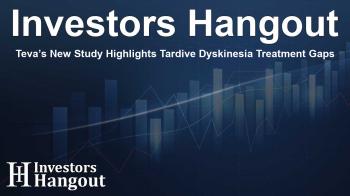Teva’s New Study Highlights Tardive Dyskinesia Treatment Gaps

Understanding Tardive Dyskinesia Treatment in Long-Term Care
Tardive dyskinesia (TD) is a challenging and often misunderstood movement disorder, increasingly recognized for its prevalence among individuals receiving certain mental health therapies. Recent findings by Teva Pharmaceuticals reveal an alarming pattern of undertreatment among patients with TD residing in long-term care (LTC) facilities. These insights, shared at Psych Congress Elevate, paint a picture of urgent need for better diagnosis and care.
The Treatment Landscape for TD
Current research shows that more than half of the residents suffering from tardive dyskinesia in LTC settings do not receive the standard of care treatment mandated for their condition. This underlines a significant discrepancy wherein many are improperly managed due to various factors, including misdiagnosis with broader terms like extrapyramidal syndrome (EPS).
Teva's Commitment to Addressing Care Gaps
Teva Pharmaceuticals (NYSE: TEVA, TASE: TEVA) is deeply committed to raising awareness and advancing research aimed at uplifting the standards of care for patients with TD. Executive Vice President Eric Hughes emphasizes that accurate diagnosis, coupled with timely treatment initiation, is critical in effectively managing TD in LTC environments.
Research Findings that Matter
The study by Teva sheds light on key findings that bring to the forefront the challenges faced by residents in LTC facilities. For instance, of the individuals on antipsychotic drugs, only a fraction—5.6%—was diagnosed with EPS, while an even smaller percentage, 1.1%, had a confirmed TD diagnosis. This indicates that many individuals could be left unaware of their actual conditions.
Comorbid Conditions and Their Impact
In examining the demographic of those at risk, it was noted that numerous patients displayed comorbidities such as dementia, chronic pulmonary disease, and congestive heart failure. Notably, under 1% had moderate or severe liver disease, highlighting the diversity of health issues prevalent among patients who may require specialized management for TD.
Challenges in Diagnosis and Treatment
The insights from Teva elucidate that nearly half of the patients diagnosed with TD in LTC settings do not receive the recommended standard of care treatment, specifically the vesicular monoamine transporter 2 inhibitor (VMAT2i). Instead, the majority are prescribed alternative treatments that are not FDA-approved, with benztropine being the most common. Alarmingly, 25% of patients were left entirely untreated.
Moving Forward: Improving Patient Care
Addressing the gaps identified in the study is vital for improving outcomes for individuals suffering from TD. Dr. Amita Patel emphasized that the complexities of TD diagnosis often lead to misconceptions about symptoms and treatment strategies, which can dangerously perpetuate undertreatment. Residents are encouraged to actively engage with healthcare providers to ensure accurate diagnoses and explore appropriate treatment options. This proactive approach is essential in ensuring residents in LTC facilities receive the quality of care they deserve.
The Importance of Vigilant Evaluation
The retrospective analysis conducted involved examining data from around 700,000 residents on antipsychotic medications, revealing that a substantial number are prone to lapses in receiving suitable diagnoses or standard care protocols. This situation underscores the pressing need for heightened evaluations within LTC environments aimed at improving both the recognition and treatment of tardive dyskinesia.
A Look at Teva's Impact in Biopharmaceuticals
Teva Pharmaceutical Industries Ltd. stands as a beacon of innovation in the biopharmaceutical landscape, with a legacy that spans over a century. Their unwavering commitment to enhancing global health is evident not only through their development of advanced therapies but also their robust generics and biologics portfolio. Teva's global presence, featuring a workforce of 37,000 in 57 markets, fortifies its ability to address diverse patient needs and push forward the boundaries of treatment possibilities.
The Role of Consumer Awareness
As with any healthcare concern, public knowledge and awareness play a crucial role in helping to mitigate the issues surrounding tardive dyskinesia. Teva's campaign to educate both patients and healthcare professionals underscores the importance of recognizing and properly addressing TD's impact on individuals’ lives.
Frequently Asked Questions
What is tardive dyskinesia?
Tardive dyskinesia is a chronic movement disorder characterized by uncontrollable movements, often a side effect of long-term use of certain psychiatric medications.
What are the common treatment options for TD?
Standard treatments include vesicular monoamine transporter 2 inhibitors (VMAT2i), but many patients may receive non-FDA approved alternatives.
How prevalent is TD in long-term care settings?
Many studies suggest a significant portion of individuals in LTC settings suffer from TD, yet a high percentage go undiagnosed or untreated.
Who is most at risk for developing TD?
Patients taking antipsychotic medications for extended periods are at a higher risk of developing tardive dyskinesia.
How can patients advocate for better care regarding TD?
Patients should engage in discussions with healthcare providers about their symptoms and treatment options to ensure they receive accurate diagnoses and appropriate care.
About The Author
Contact Logan Wright privately here. Or send an email with ATTN: Logan Wright as the subject to contact@investorshangout.com.
About Investors Hangout
Investors Hangout is a leading online stock forum for financial discussion and learning, offering a wide range of free tools and resources. It draws in traders of all levels, who exchange market knowledge, investigate trading tactics, and keep an eye on industry developments in real time. Featuring financial articles, stock message boards, quotes, charts, company profiles, and live news updates. Through cooperative learning and a wealth of informational resources, it helps users from novices creating their first portfolios to experts honing their techniques. Join Investors Hangout today: https://investorshangout.com/
The content of this article is based on factual, publicly available information and does not represent legal, financial, or investment advice. Investors Hangout does not offer financial advice, and the author is not a licensed financial advisor. Consult a qualified advisor before making any financial or investment decisions based on this article. This article should not be considered advice to purchase, sell, or hold any securities or other investments. If any of the material provided here is inaccurate, please contact us for corrections.

